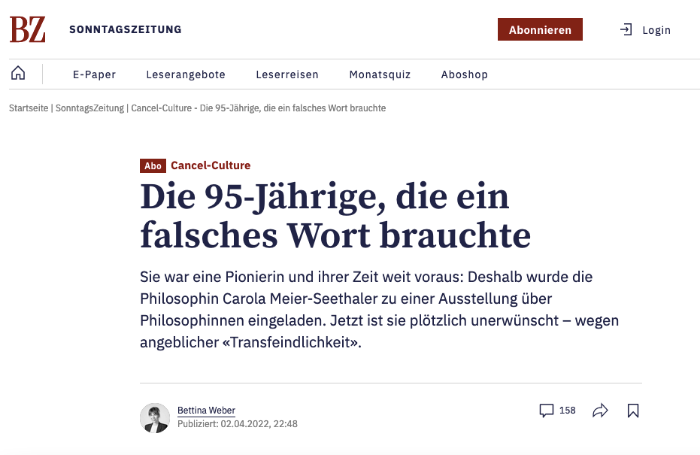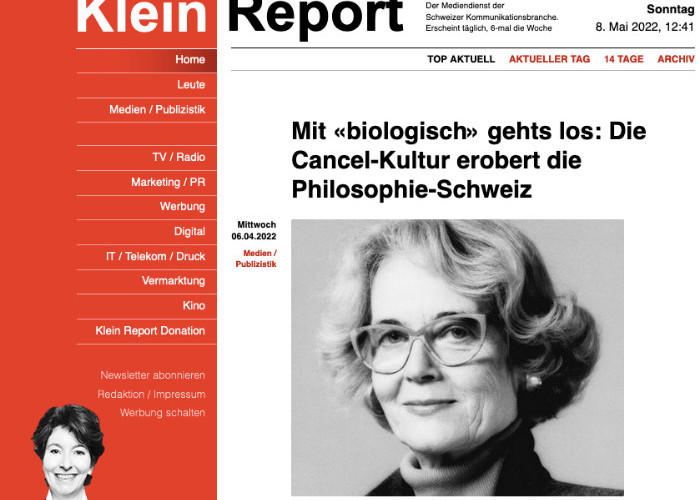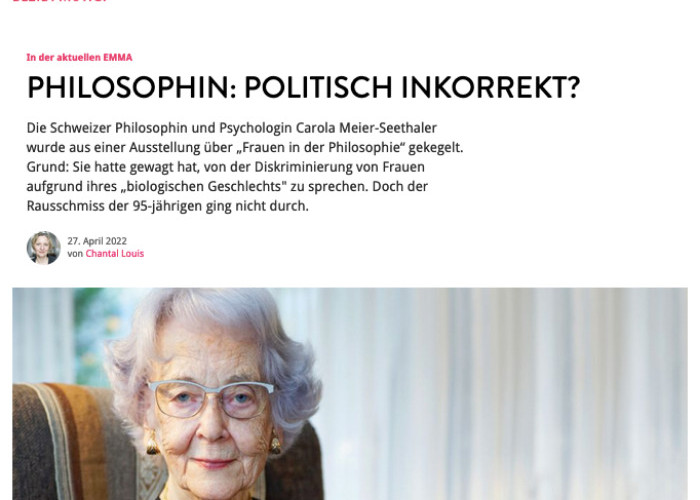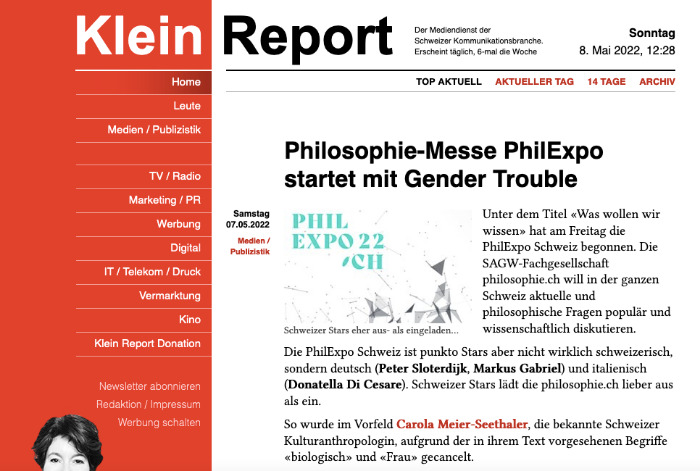(EN) SW*IP CH Statement: philoSOPHIA
- swipswitzerland

- May 8, 2022
- 1 min read
This slideshow gives an overview of the media coverage since the publication of Bettina Weber's article in the Sonntagszeitung on March 19, 2022, accusing the curators of philoSOPHIA, an exhibition on women* in philosophy in the context of philExpo22, of excluding Carola Meier-Seethaler and of "cancel culture." Status as of May 8, 2022.
Timeline of Events
Summer 2021 The philosophy festival, philExpo22 begins organising events throughout Switzerland.
14.06.2021 Tanja Liebschwager and her team begin planning philoSOPHIA, an exhibition on women* in philosophy in Switzerland taking place within the framework of philExpo22.
14.02.2022 The curators of philoSOPHIA contact women* philosophers in Switzerland, to ask for contributions to their exhibition and they invite Carola Meier-Seethaler in this context to compose a text or video.
14.03.2022 The curators of philoSOPHIA restructure their exhibition and propose to Carola Meier-Seethaler to move her contribution to another area of the exhibit
19.03.2022 Carola Meier-Seethaler retracts her contribution.
19.03.2022 Sonntagszeitung publishes an article accusing philoSOPHIA of cancel culture and of excluding Carola Meier-Seethaler for a transphobic comment made in her contribution.
27.04.2022 Other media outlets (e.g. Emma) pick up the article and the narrative of Sonntagszeitung.
SW*IP Statement
During the philExpo22 many different philosophical events are taking place throughout Switzerland. One of them, the philoSOPHIA exhibition in Basel, which is organised and curated by local students, has attracted much media attention over the last few weeks. Sadly, it has not been to highlight the important and original contribution of the exhibition nor the hard work of the students, but rather allegations have been made in various articles, regarding the curators’ treatment of feminist philosopher Carola Meier-Seethaler. It has been alleged that they engaged in cancel culture, for allegedly excluding her contribution from the exhibition due to it containing a transphobic statement. In addition, their character has also been unfairly attacked and comments have been made and published referring to them as arrogant. Throughout this process, the curators have not been given adequate opportunity to comment or voice their viewpoint.
Another thing that makes this situation particularly troubling is the fact that Tanja and her exhibition are being singled out from more than 80 events taking place during philExpo22. PhilExpo22 and the exhibition itself have as part of their aim to provide an overview of the philosophical landscape in Switzerland. Both the curators of philoSOPHIA and the organisers and coordinators of philExpo22 went out of their way to make their events as inclusive, diverse, and representative as possible. Accusing them of cancel culture is plainly ridiculous and evidently false.
The founding goal of SW*IP CH is to amplify the voices of women and other gender minorities working in philosophy and to end gender-based discrimination for all persons. We do this by working to create inclusive and safe spaces where we can learn and grow as philosophers and as people. This is why SW*IP is involved in the philExpo22 with several events and has also cooperated with the curators of philoSOPHIA in Basel. It is also why we now provide Tanja Liebschwager the space to publish her response to the treatment of the curators of philoSOPHIA.
Over the past weeks, Tanja has experienced mobbing, bullying, and been harassed and threatened online. We strongly condemn the violence, harassment, as well as personal attacks and, are very concerned about the state of the public debate surrounding issues of feminism and gender. Furthermore, we find the media treatment of Tanja and the other curators to be reprehensible. To publicly target and single out a group of students, who are engaging in an educational project, the goal of which is to learn about curation and the history of femme-identified persons in philosophy in Switzerland is an abuse of power. It unfairly stigmatises their work and makes them the target of online harassment. In light of this treatment, our mission-statement demands that we get involved and provide our full support to Tanja and the team of curators of philoSOPHIA.
In our view, what has happened here is part of a larger issue in which nuanced and important discussions around gender in academic spaces are instrumentalised and used to create clicks using hyperbolic claims about so-called cancel culture. Tanja and the exhibition are also being targeted by a media outlet that has a history of publishing transphobic and deeply conservative content under the guise of having a balanced discussion on the question of who counts as a woman. This is part of a larger pattern, in which the “woman question” is used to instrumentalise trans persons’ experiences in order to further a deeply conservative and harmful discourse about gender. The position of SW*IP CH is that gender identities are materially real and must be respected. We support the curators’ goal of creating an exhibition that does just that.
Furthermore, we want to point out that the kind of bullying, mobbing, and harassment aimed at Tanja and the curators of this exhibition in and by the media is an example of the kind of treatment that women* and gender minorities in philosophy experience. Such treatment is one of the reasons that women* and gender minorities, as well as feminist philosophical works, are underrepresented, marginalised, and excluded in the discipline of philosophy. It creates an unsafe and toxic environment for everyone. For those affected, a failure to address such violent treatment or the hostile environment it creates is often experienced as a tacit endorsement of such structural violence. It is imperative that we show solidarity and condemnation is therefore absolutely required.
Below you find Tanja’s statement on the matter. In addition, you can also find the response of the philExpo22 team, as well as a list of events to attend in case you are interested in learning more about topics such as feminist philosophy, gender discrimination, and public debates. We also strongly recommend reading our Good Practice Guide, which gives detailed information about how to create inclusive and safe spaces in philosophy institutes.
Now we let Tanja’s words speak for themselves.
Statement by Tanja Liebschwager
Translated from German. Read the original here.
For about a year now, I have been planning the exhibition philoSOPHIA together with a good friend and now with a somewhat larger team. PhiloSOPHIA deals with women* and female-read persons in philosophy. Our team has never organised an exhibition before and we have acquired the necessary knowledge to do so completely by ourselves. We are doing all our work free of charge in our spare time. From the very beginning, it was important to us to include different perspectives, which is why, for example, we had a long conversation about the definition of the group of people who are participating in and are part of the exhibition.

As (former) students, it is our concern that when Swiss philosophy is presented in the context of philExpo22, the stereotype of the male philosopher is not simply solidified. This is the common thread of the exhibition, which connects different topics and perspectives. To address the guiding question of philExpo22, “What do we want to know?” I asked a wide variety of philosophically active women and female-read persons if they would like to contribute an image and text or video. I was simply overwhelmed by the number of responses and was very happy about the support of those involved. In the meantime, I have read an incredible amount on the topic of the underrepresentation of women in philosophy, talked to a wide variety of people about it, and have been very encouraged in the importance of bringing this issue to the public's attention in relation to other disciplines as well. Nevertheless, we are not experts on the topic of gender and the exhibition is not one, which deals with the question, "What is gender?” Nevertheless, our exhibition should be a safe space for people of any gender, which we also emphasised to Bettina Weber, the author of the article in the Sonntagszeitung.
Now to correct that article, as this is the first time we are planning an exhibition, and we are doing so without professional help, there have been ongoing conceptual changes. Among other things, we have decided that the film that will be shown during the exhibition must be shorter; therefore, we have completely eliminated the section of the film in which people were supposed to talk about their experiences in philosophy. For those, who had not yet sent us anything on the topic, we were able to inform them, cancel as quickly as possible, or look for rescheduling possibilities. This included Carola Meier-Seethaler, who would have submitted the video later than others. This decision also had the consequence that we implemented the part of the exhibition that shows testimonials of women* philosophers as an anonymous pinboard. The fact that this part will be anonymous has nothing to do with so-called cancel culture, but with the fact that people shared private things about themselves and several contributors have wished to remain anonymous. The fact that we asked Carola Meier-Seethaler to exhibit her contribution there has to do with the fact that its content would actually have fit better there, as she her text reports about exciting experiences in philosophy. If we had moved the contribution to this other thematic area, the entire text, which we generally found very good, would have been somewhat shortened to fit the format of the experience reports. These are curatorial decisions that we have to make so that our exhibition can maintain its narrative and so that a contribution does not pick up on topics that are actually dealt with in another part of the exhibition. These curatorial decisions are also common in professional exhibitions. Consequently, the decision is primarily conceptual, which is what we told Carola Meier-Seethaler, and has little to do with the sentence that Bettina Weber brings into focus in her article. What reinforced the idea to edit the text was a look at Carola Meier-Seethaler's website as well as the reaction of a trans* person on our team, which again is at most marginally related to this one sentence. As the author reports in her article, we told Carola Meier-Seethaler that the sentence could remain as it was if the contribution would be exhibited with the portraits, because from the start, the goal of the portraits was that a wide variety of philosophically active women and female-read persons present their engagement with philosophy and we were aware that in doing so we would not agree equally with all texts.
Carola Meier-Seethaler has not been excluded from the event and discourse as the headline of the article suggests. Quite to the contrary, we tried to find a solution so that her contribution would fit well within the exhibition, because her contribution, as it was, was partly a report on her experiences and partly a report on her philosophical interests and we treat these areas as separate from each other in terms of location. Finally, the rescheduling of her contribution was only a suggestion on our part and by no means a requirement or a rejection. We would have welcomed it very much if Carola Meier-Seethaler had inquired back so that we could have found possible solutions together. After all, there would have been other possibilities for the location of her contribution. Instead, before it could come to that, we received a list of deeply fundamental philosophical questions as well as a false accusation with a tight deadline for a reply from Bettina Weber. This was very unexpected, but we corrected the false accusation right away, for which the author then apologised. The appearance of the article was then very shocking and hurtful, especially because Bettina Weber did not inform us in advance that she was going to write an article. I was unknowingly quoted from private email correspondence and my statements were placed in a completely wrong context. We also received a rejection from a participant whose contribution I was actually very excited about and I received and continue to receive threatening hate emails and I was and am being called very unpleasant names by strangers in the comments of the article. Additionally, the commenters aggressively make fun of trans people, my generation, and our supposed lack of life experience. Bettina Weber is selling a deliberately provocative and distorted narrative in which she is creating a straw person to pursue a conservative political agenda.
Statement by the philExpo22 Team
On the Curatorial Decisions of philExpo22 Events:
PhilExpo22 is a festival of philosophy with diverse and heterogeneous events. The titles and contents of all events in the festival are solely determined by the organisers and curators of each of them. This applies to the case of philoSOPHIA. The decisions of each event’s organisers and curators are their own and are not representative of the festival.

One of the curators of the philoSOPHIA exhibit is a member of the festival’s coordination team and is responsible for the festival’s social media. Contrary to press reports, she never communicated in the name of the philexpo22 team or in the name of the association philosophie.ch regarding the organisation of the exhibit.
A Few Tools on Debate Culture:
What is a debate? According to the Oxford English Dictionary it is: “Public discussion on pre-established topics, on which each participant is allowed to express and justify his or her opinion.”
What does it mean to curate? Cambridge English Dictionary states: “to be in charge of selecting and caring for objects to be shown in a museum or to form part of a collection of art, an exhibition, etc.”
Collins: “To curate something is to carefully choose, arrange, and present different items in order to get a particular effect.”
To select, to carefully choose and arrange. The curators of the exhibition philoSOPHIA (an initiative taking place within the festival philExpo22 – A week of philosophy in Switzerland, with a total of more than eighty events) are responsible for designing the conceptual and material presentation of the exhibit. This role has political as well as aesthetic dimensions. These decisions (format, location, etc.) were discussed with all the intellectuals who were asked to contribute with their work: a short text, a photo and possibly a video. Discussing the details of the content of an exhibition, paying attention to the words, negotiating, and analysing what they allude to, what system of values they carry with them, belongs to the collaborative creative process of a cultural event.
It is not a public proceeding; it does not fall under the definition we have seen of debate. It is no more a public debate than is the rehearsal of a play or a concert, the comments of a director during the production process, or the correspondence of a journalist writing an article and an editor. Why? because the play, the article, is not (or, perhaps, not yet) staged or published, i.e., made public. Speaking generally, we can certainly say that an exhibit intervenes in a certain debate; in other words, it expresses or conveys a view related to the theme discussed in the public sphere through journalistic or academic publications or political activities. (I will leave aside here the question of social differences in access and the risks associated with these tools and domains, as well as to the cognitive and political resources linked with them such as: language, specialisation and ease with the dynamics of communication, quality of attention available and accessible, institutional and legal support, etc.). But an event only intervenes in a debate once it has opened its doors, not while it is still in preparation.
The exchange of communication published in the article (a private exchange for which permission was not sought) only shows that the curatorial work was in process. The focus on the supposedly "arrogant " request to change a term within the text and to arrange the material in a certain way disregards the curatorial process. A curator wants to achieve certain effects on the viewers, and the means for achieving these effects are chosen and implemented by the curators. On a legal level, this is because the content of an exhibition is primarily the responsibility of the curators, and it is the curator who bears legal liability for the contents of the event. On a more material level, effects and criteria are designed within a curatorial practice, because this practice does not take place within a neutral context and, "every place radically imbues (formally, architecturally, sociologically, politically) with its meaning the object (work creation) shown there" (D. Buren, Radically, dialectically, in: Thinking about Exhibitions, Routledge, 1996, p.223).
The title of Bettina Weber’s article[1] should have been: "curators of an exhibition discuss the content thereof with invited contributors and found out that they disagree on what to show and how to arrange it. The contributor decides to withdraw.” But that would not have gotten so many clicks.
The group is composed of young, curious, intelligent, and enthusiastic people creating this exhibition on a volunteer basis. Some of them recognise themselves in the gender they were assigned at birth and some do not. They answered, "We don’t want to give space to Transfeindlichkeit” and "for us the debate stops at the point in which people are discriminated against and harassed based on their own existence” to a question asking if philosophy teaches us to always be open to debate or whether this has limits. This was meant to be a statement about their general view and how this is reflected in the exhibition; it was not mentioned with regard to the philosopher's own work.
Due to this, we believe that the media focus on the episode has been poorly intended and disproportionate, in this respect, we are embittered in particular by the online mistreatment that this attention has caused for our colleague.
We regret that there seems to have been a miscommunication between the curators and Carola Meier-Seethaler, who generously and actively showed her commitment. We are glad to hear that Carola Meier-Seethaler was happy to participate in the festival philExpo22 in which she is, and she has always been, welcome.
There are several meetings, gatherings, and workshops on feminist philosophy in the program of the festival, and many philosophical currents/positions taking part in them (some will also be available online). We gladly invite anyone who would like to participate in the discussions to:
09/05 – h 13:00 - Doing Philosophy Better (1) Vortrag / Diskussion der Society for Women* in Philosophy (SW*IP), UZH Kutscherhaus, Zollikerstr. 115, Seminarraum, ZOB E 2. Animiert von: Karen Poertzgen, Aneta Zuber.
09/05 – h 18:15 - Philosophies et féminismes : propositions pour une coalition des savoirs. Conférence organisée par le Groupe Genevois de philosophie, à l’Université de Genève, Bâtiment d’Uni Mail, Bd du Pont-d’Arve 40, Genève. Invitée : Cynthia Kraus
10/05 – h 15:00 - Doing Philosophy Better (2) Bystander Training der Society for Women* in Philosophy (SW*IP), Feministisches Streikhaus Zürich, Sihlquai 115. Animiert von: Deborah Mühlebach und Rebekka Hufendiek.
13/05 – h 14:00 - Feminist Epistemology. Workshop im Raum 115 des Hauptgebäudes der Universität Bern, Hochschulstrasse 4, Bern. Organisiert und durchgeführt von: SW*IP.
14/05 – h 18:15 - Epistemic Wrongs Workshop und Podiumsdiskussion vom Philosophischen Seminar UZH & Philosophische Gesellschaft Zürich, KOL-G-204, UZH-Zentrum, Rämistr. 71. Referentin: Veli Mitova (University of Johannesburg).
The opportunities for debate will be manifold! Usually, debates and discussions take place after one or more presentations and share the same topic. Do you want to discover more about debate? There are also many events focusing on debate culture. We invite you to:
07/05 – h 20:00 - Ethik des Nichtwissens. Referat und Diskussion organisiert von den Bieler Philosophietagen im Saal des Farelhauses, Oberer Quai 12, Biel/Bienne. Sprache/Langue: Deutsch mit Simultanübersetzung ins Französische. Gast/Invité: Markus Gabriel.
07/05 – h 15:00 - Wer sorgt sich um sich selbst? Diskussionsrunde an der EHT-GESS, ETH-CLW, Clausiusstrasse 49. Animiert von: Michael Hampe.
08/05 – h tbd - Das will ich gar nicht wissen! Podiumsdiskussion organisiert von der Krino -Philosophische Gesellschaft Bern.
09/05 – h 19:00 - Was wir lieber gar nicht wissen wollen. Philosophisches Café. Organisiert von philocom Philosophische Praxis und Volkshochschule Bern. Unitobler, Lerchwenweg 36, Bern. Durchgeführt von: Detlef Staude und Andreas Heise.
12/05 – h 19:00 - Risse in der Gesellschaft. wahrnehmen – verstehen – überwinden. Podiumsgespräch im Raum 101 des Hauptgebäudes der Universität Bern. Organisation und Moderation: Thomas Schüpbach, Hochschulseelsorger (forum3) & André Lourenço, stud. Religionswissenschaft.
13/05,– h 16:00, 14/05 -h 10; 14/05 – h: 20:00- FULL DIALOG – Eine Anleitung zum Streit. Kunstinstallation im Kornhausforum, Kornhausplatz 18, Bern. Organisiert und durchgeführt von: pulp.noir.
07/05 – h 19:30 Wissen und Weisheit – Philosophische und (interreligiös-)theologische Perspektiven zu(r) Weisheit. Thematischer Input (Panel zu dritt) und anschliessende Diskussion mit allen Teilnehmenden, Atelier für Kunst und Philosophie, Albisriederstrasse 162. Animiert von: Martin Kunz, Markus Huber und Jasmine Suhner.
[1] B. Weber, Cancel-Culture - Die 95-Jährige, die ein falsches Wort brauchte, Sonntags Zeitung 02/04/2022, published at 22:48.
Philosophical Implications - Thoughts by Ilaria Fornacciari (philExpo22)
This « incident » is not irrelevant to the theme of the festival. The red thread of the week is “What do we want to know?”. The general intent is to open up the classic Kantian question about the modern subject of knowledge (What can I know?) in two directions: from the subject to intersubjectivity (we); from the possibility to the will (want). The implicit question is therefore first: what is/who are « we »?
What strikes me is that « we » is probably exactly what we negotiate and renegotiate constantly in what we call « democracy ». In the immanence of the social context, the rules, and limits of being together, who we are and who we are not, are not decided nor imposed from above, are not considered untouchable or transcendent. This « incident » concerns the definition of a « we »: it is a missed or failed negotiation. Among the initiatives of the festival, as the organisation is not centralised in space and time, there are and will be a kaleidoscope of «we»s, some of them are perhaps stable in time, linked to an institution with a history or tradition, some of them younger, some « we »s will last the time of a conversation, some we hope will be born. We are not sure if a big inclusive « we » will come out of this experience, but among those « we »s we are trying to construct bridges. This « incident » shows that some « we »s are difficult to stretch.













Comments